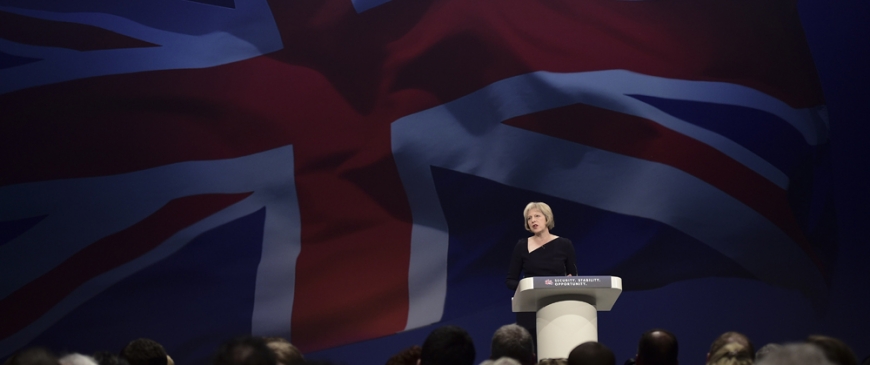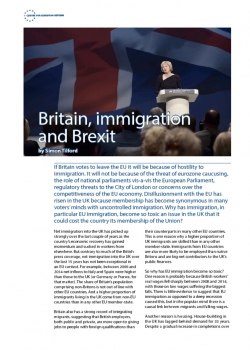
Britain, immigration and Brexit
If the UK quits the EU, it will be because British politicians have pandered to anti-immigrant sentiment rather than addressing the supply-side failures that drive it.
If Britain votes to leave the EU it will be because of hostility to immigration. It will not be because of the threat of eurozone caucusing, the role of national parliaments vis-a-vis the European Parliament, regulatory threats to the City of London or concerns over the competitiveness of the EU economy. Disillusionment with the EU has risen in the UK because membership has become synonymous in many voters’ minds with uncontrolled immigration. Why has immigration, in particular EU immigration, become so toxic an issue in the UK that it could cost the country its membership of the Union?
Net immigration into the UK has picked up strongly over the last couple of years as the country’s economic recovery has gained momentum and sucked in workers from elsewhere. But contrary to much of the British press coverage, net immigration into the UK over the last 15 years has not been exceptional in an EU context. For example, between 2000 and 2014 net inflows to Italy and Spain were higher than those to the UK (or Germany or France, for that matter). The share of Britain’s population comprising non-Britons is not out of line with other EU countries. And a higher proportion of immigrants living in the UK come from non-EU countries than in any other EU member-state.
Britain also has a strong record of integrating migrants, suggesting that British employers, both public and private, are more open to giving jobs to people with foreign qualifications than their counterparts in many other EU countries. This is one reason why a higher proportion of UK immigrants are skilled than in any other member-state. Immigrants from EU countries are also more likely to be employed than native Britons and are big net contributors to the UK’s public finances.
So why has EU immigration become so toxic? One reason is probably because British workers’ real wages fell sharply between 2008 and 2014, with those on low wages suffering the biggest falls. There is little evidence to suggest that EU immigration as opposed to a deep recession caused this, but in the popular mind there is a causal link between migrants and falling wages.
Another reason is housing. House-building in the UK has lagged behind demand for 35 years. Despite a gradual increase in completions over the last two years, Britain is still building a third less houses than it was in 2007, with the result that the shortage of housing is becoming more acute every year. In many parts of the country, prices are out of reach for people on average incomes, let alone low paid workers. This has left a rising proportion of the workforce living in expensive, cramped, privately rented accommodation. Britain now has the lowest living space per inhabitant of any EU-15 country and the smallest new homes in the EU-28. Many blame immigrants for this state of affairs, but the real culprit is an egregious failure of public policy.
Immigrants are also blamed for putting the National Health Service (NHS) and education services under pressure. As already noted, EU immigrants are net contributors to public finances and hence are not to blame for under-funded public services. But this is not the way it appears to many Britons on waiting lists for NHS care or unable to get their children into their local school. The problem is again public policy: the supply of public services is too slow to respond to increased demand for them. This is partly because of the government’s squeeze on public spending. But it also reflects an institutional problem: the tax benefits of immigration flow to central government, which is slow to compensate organisations such as the NHS or local education authorities for the costs of providing the additional public services required by immigrants.
A final factor behind rising hostility to immigration is the diminishing social status of the white working class. There has been a marked improvement in average educational attainment in the UK in recent years, but this improvement has largely passed by white working class households. This group is now easily the worst educated in the country, as well as the most likely to be in low-paid work and to be competing for scarce supplies of social housing. The offspring of white working class parents are much less likely to go to university than the offspring of immigrant parents. Britain has an admirable record of integrating immigrants, but is proving weak at addressing the problems of poor white citizens.
In short, attitudes to immigration are being fanned by the failure of successive governments to tackle the country’s real problems: housing, the poor educational performance of the white working class and the financing of public services. Immigrants, in turn, have become an easy scapegoat for politicians of nearly all persuasions. It is easier to blame them than address the chronic policy failures driving the rise in anti-immigrant sentiment.
The Conservatives have been especially guilty of this. The burden of austerity has fallen hardest on the poorest and weakest in society through cuts in welfare and other social spending; the better off have been largely shielded from its effects. By implicitly linking immigration with the pressures on public finances and public services and the housing shortage, the government has made sure that some of those who might have blamed the government for these problems are blaming immigrants.
This has drawn attention away from the impact of government policies, but it has done so at a high cost. By talking about immigration as a problem and treating the need to reduce it as axiomatic, politicians have legitimised xenophobia. The reason anti-immigrant sentiment is focused on EU migration as opposed to immigration from outside the EU is simple: complaining about Polish immigration is not seen as racist in the way complaining about black or Asian immigration is. But it is just as xenophobic, and pretending otherwise is a major reason why Britain has got itself into such a mess over the issue. It could cost the country its EU membership, which both the government and the Labour Party acknowledge confers far more benefits than costs on the UK.
The EU faces serious challenges, from eurozone governments’ failure to get on top of the problems of the eurozone to the inability of EU institutions to bridge the gap between themselves and ordinary EU citizens. But if the UK leaves the EU, the reason will be of British politicians’ own making: popular hostility to immigration. The tragedy is that this situation could have been prevented, had the Labour Party and the Conservatives shown some leadership by refusing to link immigration with social and economic problems, and by facing down populist sentiment in the media rather than pandering to it. But that would have required them to get serious about addressing the country’s supply-side problems, and neither has shown much stomach for that fight.
Simon Tilford is deputy director of the Centre for European Reform.

